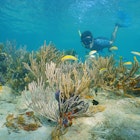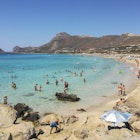
Costa Rica is asking travellers not to take wildlife selfies
Nov 14, 2019 • 1 min read

Costa Rica is aiming to become the first country to regulate the incidence of selfies involving wild animals © DeAgostini/Getty Images
- placement: fullWidth
- path: articles/in-content-top
- possible size: [970, 250], [970, 90], [728, 90], [300, 250], [320, 50], [1, 1],
- targeting:
{ "url": "costa-rica-wildlife-selfies", "destination": "Costa-Rica", "continent": "Central-America", "country": "Costa-Rica" }
Costa Rica has launched a campaign asking travellers not to take wildlife selfies. It is home to more than 5% of the world's biodiversity and is one of the countries with the greatest biological wealth. However, selfies and photographs in direct contact with wild animals are causing great damage to this biodiversity, and it is aiming to become the first country to regulate the incidence of selfies involving wild animals through the initiative #stopanimalselfies.
- placement: fullWidth
- path: articles/in-content-middle
- possible size: [970, 250], [970, 90], [728, 90], [300, 250], [320, 50], [1, 1],
- targeting:
{ "url": "costa-rica-wildlife-selfies", "destination": "Costa-Rica", "continent": "Central-America", "country": "Costa-Rica" }
Wildlife in Costa Rica is a public domain property protected by the state, and according to Pamela Castillo, vice-minister of environment and energy, direct contact with wild animals represents a risk to people and generates stress and suffering to the fauna. "Animals can also carry illnesses or get sick by pathogens transmitted by human beings," she says. "For these reasons, it is necessary to keep a safe distance when they are seen in their natural habitat or sanctuaries and respect their natural behavior."
- placement: native
- path: articles/in-content-native
- possible size: [f, l],
- targeting:
{ "url": "costa-rica-wildlife-selfies", "destination": "Costa-Rica", "continent": "Central-America", "country": "Costa-Rica" }
The campaign is asking visitors to refrain from offering food to wild animals and trying to capture them. They should not make loud noises or throw objects to animals in sanctuaries or rescue centres to try to get their attention, and should also never touch, grab or hold an animal. The campaign wants to raise awareness about the negative impacts of selfies and photographs that show direct contact with wild animals, and it seeks to reduce these cruel behaviours and warn of the possible risks involved.
For further information on the campaign, please see here.
Read more: How to be a responsible wildlife tourist
- placement: fullWidth
- path: articles/bottom
- possible size: [970, 250], [970, 90], [728, 90], [300, 250], [320, 50], [1, 1],
- targeting:
{ "url": "costa-rica-wildlife-selfies", "destination": "Costa-Rica", "continent": "Central-America", "country": "Costa-Rica" }
Explore related stories


 Wildlife & NatureThese 10 sustainable travel experiences are both exciting and rewarding
Wildlife & NatureThese 10 sustainable travel experiences are both exciting and rewardingAug 8, 2024 • 6 min read



 BeachesThe 14 best places to visit in Central America: ruins, reefs and romantic beaches
BeachesThe 14 best places to visit in Central America: ruins, reefs and romantic beachesJul 30, 2024 • 8 min read



